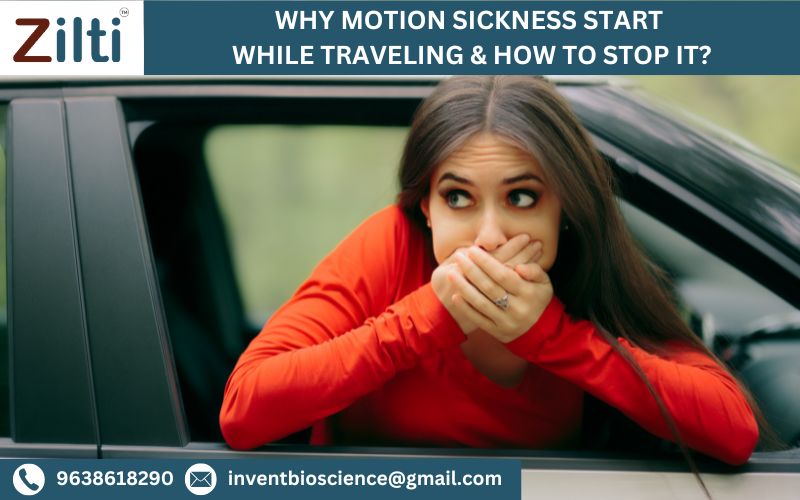Motion sickness is a problem many of us face while travelling. It can turn what should be a fun trip into an uncomfortable and sometimes miserable experience. Knowing what motion sickness is, its symptoms, causes and treatments can help you manage it and enjoy your travels. In this blog we go into the science of motion sickness and give you practical tips to prevent or alleviate it. Plus find out how Zilti tablets can help you travel comfortably.
What is motion sickness?
Travel sickness is a condition where your eyes, inner ear and brain get mixed signals. Essentially your brain gets confused about movement and that’s when the classic motion sickness symptoms appear.
While motion sickness can happen to anyone, some people are more prone to it due to genetic or physiological reasons. It can happen in any mode of transport, cars, buses, trains, boats and airplanes.
Motion Sickness symptoms
Knowing the symptoms of motion sickness is the first step to managing it. Common Travel sickness symptoms are:
- Nausea
- Vomiting
- Dizziness
- Sweating
- Fatiguezilti
- Headache
- Pale skin
- Increased salivation
Symptoms can range from mild to severe nausea and vomiting depending on the individual and the travel conditions.
Why Does Motion Sickness Start When Travelling?
The root of motion sickness is sensory conflict. Here are the reasons why Travel sickness starts during travel:
1. Mismatch of Sensory Inputs:
When you’re reading a book or looking at your phone in a moving vehicle, your eyes see a stationary environment while your inner ear senses movement. This conflict confuses your brain and causes travel sickness.
2. Vestibular System Sensitivity:
The vestibular system in your inner ear is responsible for balance and spatial awareness. Some people are more sensitive to this system and are more prone to motion sickness.
3. Type of Movement:
Unpredictable or unfamiliar movements, like turbulence in a flight or choppy waters in a boat can trigger Travel sickness more than smooth and predictable movement.
4. Lack of Adaptation:
If you’re not used to travelling or a particular mode of transport, your body may not adapt and you’re more likely to get travel sickness.
5. Genetic Predisposition:
Research shows that genetics may play a role in motion sickness. If you have a family history of Travel sickness you may be more prone to it.
How to stop motion sickness: Tips & Treatments
Motion sickness can be uncomfortable but there are several ways to alleviate or prevent it. Here’s the guide:
1. Behavioral Strategies
Where to Sit:
In cars sit in the front seat. In boats sit near the center and look at the horizon. & In airplanes sit over the wings where the motion is less.
Focus on a Stable Object:
Look at a fixed point, like the horizon, to help your brain process the info.
Don’t Read or Screen:
Reading or looking at your phone while moving will make symptoms worse.
Breathe Deep:
Deep and steady breathing will calm your body and reduce nausea.
Open a Window or Ventilate:
Fresh air will help with nausea and make you feel better.
2. Dietary Tips
Eat Light Before You Travel:
Don’t eat heavy, greasy or spicy food before you travel, it will make nausea worse.
Stay Hydrated:
Drink plenty of water, but avoid alcohol and caffeinated drinks which will dehydrate you and make symptoms worse.
Ginger:
Ginger is a natural remedy for nausea. You can have ginger tea, candies or supplements before and during your trip.
Small Frequent Meals:
Eat small snacks throughout the journey to stabilise your stomach.
3. Motion Sickness Medicines
Over-the-counter (OTC) and prescription medicines can be very effective in treating travel sickness. Some common Travel sickness medicines are:
Antihistamines:
Dimenhydrinate (Dramamine) and meclizine (Antivert) are common ones. Take them about an hour before travel.
Scopolamine Patches:
Prescription patches to be applied behind the ear and can give relief for up to 3 days. Good for long journeys.
Zilti Tablets:
Zilti is a new and effective tablet to combat travel sickness. Works fast to relieve nausea, dizziness and other symptoms so you can travel stress free. Take Zilti before you travel and enjoy the comfort.
Acupressure Wristbands:
Not a medicine, acupressure bands applies pressure to specific points on the wrist to reduce nausea.
4. Natural Remedies
If you prefer natural ways, try:
Peppermint:
Peppermint tea or essential oil can calm and reduce nausea.
Aromatherapy:
Essential oils like lavender, lemon or chamomile can create a soothing environment and reduce symptoms.
Acupuncture:
Traditional Chinese medicine to balance your body and prevent motion sickness.
5. Psychological Techniques
Desensitization Therapy:
Gradual exposure to motion stimuli can help your body adapt and reduce sensitivity over time.
Cognitive Distraction:
Listen to music or talk to someone to take your mind off the symptoms.
Relaxation Techniques:
Meditation and visualization exercises can calm your nervous system and reduce symptoms.
Conclusion
Motion sickness is a pesky condition but it doesn’t have to ruin your travel plans. By knowing the causes and using the tips – from behavioral adjustments and natural remedies to travel sickness medicines like Zilti tablets – you can reduce or eliminate symptoms.
Travel is one of the best things in life and with the right preparation you can travel the world without motion sickness getting in the way. Whether it’s a road trip, a cruise or a flight, be prepared.

Leave a Reply